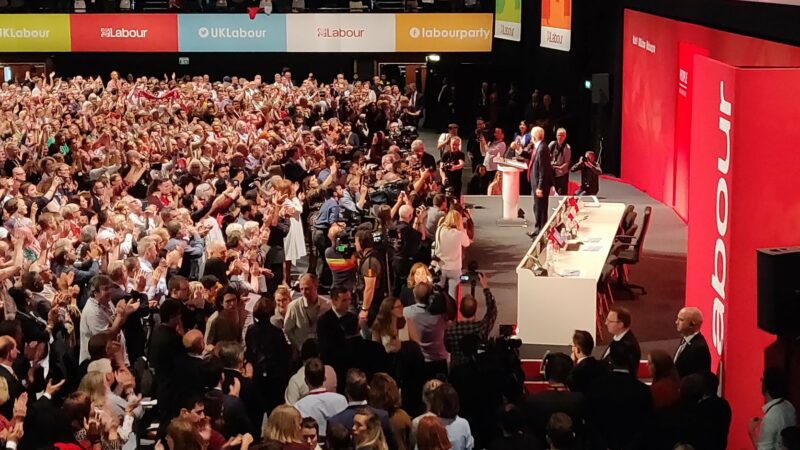
Momentum is set to push for a £15 minimum wage, a change in the Westminster voting system to proportional representation and a four-day working week among other policies at Labour conference this year following a vote of its members.
The activist organisation, which grew out of Jeremy Corbyn’s first leadership campaign, last month held its first ‘policy primary’ whereby Momentum members voted on 32 motions by local Momentum groups, affiliated trade unions and others.
Members voted in favour of bold measures, from “bringing the banking and financial system into democratic public control” to housing “all those experiencing homelessness regardless of immigration status” and implementing universal free broadband.
Momentum described the exercise as a chance to “reassert the importance of a more transformative approach” after arguing that support for Labour has declined partly because the opposition party has been “outflanked to the left by the Tories”.
The organisation has now confirmed the results of the member ballot, which will see the group campaign in the run-up to Labour conference in September for the following eight proposals:
- £15 minimum wage (includes raising sick pay to the living wage, free childcare and family-friendly rights in the workplace, sectoral collective bargaining)
- Time for proportional representation (change to general election voting system)
- Global climate justice (includes rapid decarbonisation by 2030, legal recognition of climate refugees’ right to asylum, cancellation of all low-income country debt held by UK institutions, bringing the banking and financial system into democratic public control)
- Build council housing and end homelessness (includes building 150,000 social rent homes each year including 100,000 council homes, scrapping right to buy, giving councils the power to requisition the 250,000 long-term empty homes with minimal compensation, repealing the 2012 anti-squatting legislation)
- Green jobs revolution (includes creating millions of well-paid, unionised green jobs with publicly owned entities, retrofitting all homes by 2030, universal basic services, universal free broadband, repealing all anti-trade union laws)
- Build back fairer: attack poverty and inequality (includes increasing Universal Credit to £260 a week, extending and strengthening the furlough and self-employment schemes, abolishing the ‘no recourse to public funds’ immigration policy)
- Reject integrated care systems, renationalise England’s NHS and social care (includes repealing the Health and Social Care Act 2012)
- A four-day week (32-hour working week with no loss of pay)
Momentum’s leadership, the national coordinating group, has also declared its intention to drafter a further two or three motions that challenge the government’s “authoritarian, racist and anti-worker agenda” that is “evident” in its new policing bill.
Speaking to LabourList recently about Momentum’s view of Keir Starmer, co-chair Andrew Scattergood said: “I thought ‘there’s going to be disagreements from the left’ on what he was doing, but I never thought we’d go down the route that we did.”
Momentum was “biting our lip on certain things that he did early on”, he said, but its criticism became “firmer and more consistent” when they saw what was perceived as “bad decisions, factional manoeuvres, or just the lack of anything on quite important issues”.
Commenting on the new policies today, co-chair Gaya Sriskanthan said: “Momentum members have put together a policy platform based on democracy, dignity and justice and that poses a fundamental challenge to our rigged economic and political system.
“The campaign now begins to get the Labour Party to take up these policies and advocate for them in the country. The public are crying out for change, and we must not fail them.”
On the specific decision by Momentum members to persuade Labour that the party should abandon its historic opposition to proportional representation, she added: “The Westminster political system is fundamentally broken.
“A popular consensus is building across the labour movement for a change to our First Past the Post electoral system, which has consistently delivered Tory majorities on a minority of the vote and hands disproportionate power to swing voters in marginal constituencies.
“Momentum will join the charge for PR, as part of a broader commitment to deep democratic change and alongside our strategy of building popular support for socialism in our communities.”
John McDonnell, the former Shadow Chancellor, had argued in a LabourList piece in favour of the radical electoral reform motion in Momentum’s policy primary, which made the case for PR being the most “strategically important” proposal for Labour.
The voting system change is “key to enabling all the policies we need to create a decent society”, the Hayes and Harlington MP wrote, adding that “its moment has come – and if the opportunity is not seized now, it may not come again for many years”.
Responding to Momentum’s new support for PR, Electoral Reform Society’s Willie Sullivan said: “This is a major milestone, with backing for proportional representation becoming a consensus in the Labour Party. Members and senior figures from across the party are clear about the need for real political reform – as reflected in the fact that hundreds of CLPs have now rejected one-party-takes-all voting.
“In his campaign to be Labour leader, Keir Starmer backed the principle of PR and the need to make every vote count, and the party is increasingly united behind a fair voting system. Across the country, voters feel ignored and excluded from Westminster. It’s time to change that with an inspiring vision of change, dragging parliament into the modern age at last.”




More from LabourList
Welfare vote: ‘Here are the failures it reveals – and three faint silver linings’
Welfare vote: Which Labour MPs voted against bill or backed new amendment?
‘Welfare reforms still mean a climate of fear. Changes are too little, too late’